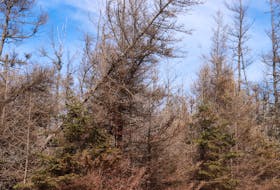She’d never been so close to something so strange – so wild.
The dark-skinned animal was big. It made little clicking noises as she and another woman, Laura Stewart, approached it.
Though obviously built for speed, this beast was going nowhere fast. It rocked and splashed its powerful tail in idle frustration.
“Hold my camera,” said Stewart to Delaney.
So she stood there, in knee-high water churned red from the animal’s struggles, and watched as her companion put one strong hand behind its back fin and another on it cylindrical body and pushed, ever so gently.
The creature slid free of whatever had trapped it in place, and slipped into the murky depths of Northumberland Strait.
Both of them shaking, the women stood there in the evening summer sun as the water lapped against their thighs.
A few days later, recounting the tale, Delaney still talks about it with a touch of awe in her voice.
She’s since learned that the creature she helped was an Atlantic white-sided dolphin, a common enough creature in these waters. They’re fast and smart, but they do have a curious propensity for getting themselves into trouble, frequently beaching themselves or getting stranded by receding tides.
This particular specimen was one of about six that Delaney and her children had been watching from their Chelton cottage on Sunday for about an hour.
“They were almost like playing tag ... They were just jovial, so to speak, and they were just having so much fun playing,” she recalled.
“It was amazing; hearing them chirp was just out of this world.”
After Stewart pointed the stranded animal back out into the water, the family went back to watching the dolphins zoom around just off shore.
Eventually, a couple of single person watercraft showed up and started following the pod around trying to get a better look.
The noise from their engines or maybe the commotion must have spooked the animals though, because they turned tail and made a line for New Brunswick.
Tonya Wimmer, a co-ordinator with the Marine Animal Response Society (MARS), based in Halifax, said Thursday that she would advise against anyone getting too close to a marine mammal unless absolutely necessary.
It’s against the law to harm, harass or disturb marine mammals in Canada.
In terms of just touching one of these animals or helping one out of a dangerous situation, it’s not illegal, but it can be dangerous, which is why groups like hers were created, she said.
“In general there aren’t hardcore rules, but I mean you’d hope people would act with the best sense possible. They do still need to do the things they do, like feeding, and if people are harassing them they can’t do that,” she said.
MARS maintains a hotline that anyone in Atlantic Canada can call when they find a dead or distressed large marine creature, like turtles, sharks, whales, dolphins or seals.
That number is 1-866-567-6277. There are specialists and volunteers in each province who can advise people who find themselves in situations like Stewart and Delaney did.
As for Delaney, she’s just glad her brush with this wild animal ended well for them both.
“It was a beautiful little thing,” she said.
@JournalPMacLean
She’d never been so close to something so strange – so wild.
The dark-skinned animal was big. It made little clicking noises as she and another woman, Laura Stewart, approached it.
Though obviously built for speed, this beast was going nowhere fast. It rocked and splashed its powerful tail in idle frustration.
“Hold my camera,” said Stewart to Delaney.
So she stood there, in knee-high water churned red from the animal’s struggles, and watched as her companion put one strong hand behind its back fin and another on it cylindrical body and pushed, ever so gently.
The creature slid free of whatever had trapped it in place, and slipped into the murky depths of Northumberland Strait.
Both of them shaking, the women stood there in the evening summer sun as the water lapped against their thighs.
A few days later, recounting the tale, Delaney still talks about it with a touch of awe in her voice.
She’s since learned that the creature she helped was an Atlantic white-sided dolphin, a common enough creature in these waters. They’re fast and smart, but they do have a curious propensity for getting themselves into trouble, frequently beaching themselves or getting stranded by receding tides.
This particular specimen was one of about six that Delaney and her children had been watching from their Chelton cottage on Sunday for about an hour.
“They were almost like playing tag ... They were just jovial, so to speak, and they were just having so much fun playing,” she recalled.
“It was amazing; hearing them chirp was just out of this world.”
After Stewart pointed the stranded animal back out into the water, the family went back to watching the dolphins zoom around just off shore.
Eventually, a couple of single person watercraft showed up and started following the pod around trying to get a better look.
The noise from their engines or maybe the commotion must have spooked the animals though, because they turned tail and made a line for New Brunswick.
Tonya Wimmer, a co-ordinator with the Marine Animal Response Society (MARS), based in Halifax, said Thursday that she would advise against anyone getting too close to a marine mammal unless absolutely necessary.
It’s against the law to harm, harass or disturb marine mammals in Canada.
In terms of just touching one of these animals or helping one out of a dangerous situation, it’s not illegal, but it can be dangerous, which is why groups like hers were created, she said.
“In general there aren’t hardcore rules, but I mean you’d hope people would act with the best sense possible. They do still need to do the things they do, like feeding, and if people are harassing them they can’t do that,” she said.
MARS maintains a hotline that anyone in Atlantic Canada can call when they find a dead or distressed large marine creature, like turtles, sharks, whales, dolphins or seals.
That number is 1-866-567-6277. There are specialists and volunteers in each province who can advise people who find themselves in situations like Stewart and Delaney did.
As for Delaney, she’s just glad her brush with this wild animal ended well for them both.
“It was a beautiful little thing,” she said.
@JournalPMacLean








